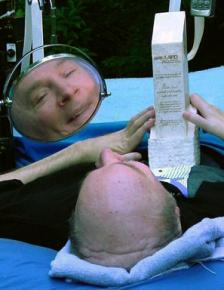A trail-blazer for the disabilities movement
remembers one of the leading figures of the disabilities movement.
FRED FAY, a pioneer in the disabilities and independent living movements, died on August 20 at his home in Concord, Mass.
He was a trail-blazer throughout his four decades-long career as a grassroots organizer and activist, working to build coalitions across a wide range of groups and organizations; connect isolated individuals and communities; push the development of assistive technology and adaptive computer technology; and get many federal laws passed ensuring equal access and protections for people with disabilities.
His work literally impacted the lives of millions for the better.
Fay, who was born in 1944, became a wheelchair user at the age of 16, after a spinal cord injury. His activism began the following year, when he co-founded a counseling and information center called "Opening Doors" with his mother.
From the time he entered the University of Illinois, which was one of the few wheelchair-accessible universities in the U.S. at the time, Fay set his sights on the unequal treatment that people with disabilities receive. As he said in a documentary filmed at this time, "I'm really a back-door citizen, or a second-class citizen, when it comes to getting into the buildings my taxes pay for."

As a disability policy adviser to various presidential administrations and Congress, Fay found himself up against not only legislative barriers, but physical ones: "I get to Washington D.C., and every single curb corner is like the Berlin Wall. You can't travel more than half a block in the city without running into a barrier."
Attending the Rose Garden signing of the Urban Mass Transportation Act of 1964, he had to be "bumped" up the stairs, as the White House was not accessible. He took the lead in campaigning for accessible transit in Washington, D.C., soon after, in 1965.
THE DEMANDS for dignity, respect and equal rights being asserted by many oppressed communities in the 1960s came from the community of people with disabilities as well. As Fay reflected decades later:
I think one of the sea changes in attitude in the '60s was the realization on the part of people with disabilities that it was the environment and attitudes of people that limited us, and not our own disabilities. And a lot of the anger that grew up in the '60s was from people who felt that other people--mainly institutions and so forth--were interested in controlling them and making decisions for them. And in the '60s, this realization that we can run our own lives was just a huge change from the attitudes that held us in a sort of "out of sight, out of mind" medical model that kept us so isolated for so many years.
In the mid-70s, Fay helped found several important organizations, including the Boston Center for Independent Living and Massachusetts Coalition of Citizens with Disabilities. He became the first president of the American Coalition of Citizens with Disabilities, which was one of the few organizations created and run by people with disabilities.
The tireless advocacy and activism of Fay and these organizations led directly to several important federal laws: the Americans with Disabilities Act of 1990, the landmark civil rights law that prohibits discrimination on the basis of disability; the Rehabilitation Act of 1973, which prohibits discrimination on the basis of disability in federal programs and employment; the Education for All Handicapped Children Act of 1975, which requires all public schools to provide equal access to education to children with disabilities; and the Individuals with Disabilities Education Act of 1997, which dictates how states provide education and support to children with disabilities.
In 1995, Fay co-founded the Justice For All (JFA) online forum, which centralized and disseminated disability rights information to people all over the world. JFA is widely recognized as being instrumental in the defense and implementation of the laws passed over the previous 20 years.
Fay has long been recognized as a driving force in movements that have themselves been characterized by resolute and unflagging self-organization and self-advocacy. As he says in the documentary A Life Worth Living, which will air on PBS on October 27, "I created my own world. It wasn't up to other people to decide who I was or what I was or where I was going. It was up to me. I didn't see any choice."
His work, his leadership and his example will live on, and continue to inspire and inform the work of thousands of activists now and in the future. ¡Fred Fay presente!


